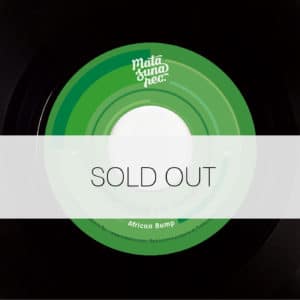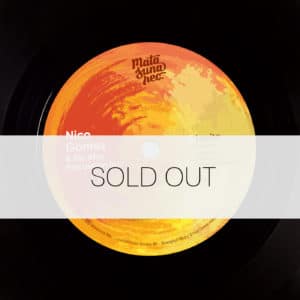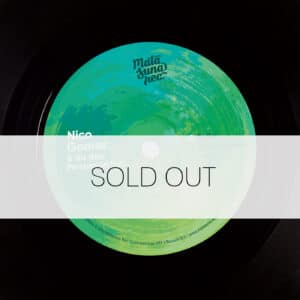Description
Matasuna Records returns to Mexico for a third time to dig for rare treasures. They got their hands on a special gem – two obscure Latin/Jazzfunk tunes by a band called Colorado from Mexico City. The songs were released in 1976 on the Mexican label Peerless and the super rare original 7inch is virtually unavailable. Fortunately, the release is finally available for the first time as an official reissue in a remastered edition. An unjustly under-the-radar Latin jazzfunk highlight!
The song Colorado, named after the band, opens the A-side of the single. The hypnotic piano puts the listener in the right mood right from the start, before the drums and percussion set the rhythm. The horns also add depth and melodiousness before the song takes a turn and reveals its funky side with guitars, synths and bass. A nice guitar solo also reveals the affinity for rock music without losing sight of the vibe of the song or tipping it a different direction. Definitely a fabulous song that comes up with a lot of ideas and inspirations, offering an unexpected richness in the under 3-minute running time.
The B-side also continues musically energetic in the same way with Para Ti. Here, too, you can feel and hear the playfulness and experimentation of these extraordinary musicians. Atmospherically dense passages alternate with quieter phases and solo parts, before the tension rises again and literally explodes. As in the song „Colorado“, rhodes, brass, guitars & bass offer a great and varied interplay. The secret highlight, however, might be the drum and percussion parts in the middle of the track, which will surely enchant not only the B-Boys and B-Girls.
Artist info
The internet, a source of almost endless knowledge, offers no information about the band Colorado. All the more fortunate that one of the band’s founding members, „Emilio Espinosa Becerra„, provides detailed info for the reissue.
In 1968 the three brothers Luis, Francisco and Emilio Espinosa Becerra from Mexico City started to rehearse together to play wellknown rock & pop songs at friends or family parties. At first, they played on Japanese guitars and a Teisco bass borrowed from a school friend. They saved up money to then buy guitar & bass amps and a microphone, which they always had to rent until then. However, the budget was only enough for Mexican replicas of the legendary Fender Bassman and the Fender Super Reverb. Original equipment was simply unaffordable.
Shortly thereafter, more members joined the band. Three musicians from the school band Tepeyac: Marco Nieto Bermudez (trumpet), Raymundo Mier Garza (tenor saxophone) and Alfonso Romero (trombone). Another classmate named „Carlos Mauricio Fernández Ordóñez“, who studied piano, also joined the group. His father had a chemical factory in the United States and helped bring equipment (amplifiers and a Farfisa Fast 5 organ) – hidden in the back of a truck – to Mexico. In the time that followed, more instruments were acquired, including bass and guitars (from Gibson, Rickenbacher and Fender) and microphones (from Shure) for vocals and horns.
With a larger band and new equipment, they played many parties in their district of Lindavista in Mexico City and neighboring areas from 1970 to 1973, as well as gigs at various festivals and school events. The group’s band name at the time was „Sound Core Brass“. However, more and more often people with turntables and speakers showed up at parties, which were also able to heat up. The so-called Sonideros, a sound system culture that was emerging in the 1960s, charged less than a multi-piece live band, so the band’s performances declined.
During those years, three other Espinosa Becerra family members joined the band: Jorge Rafael (trombone), Sergio Alejandro (tenor saxophone) and Felipe de Jesus (drums and percussion).
A brother of the musicians, Carlos Espinosa Becerra, studied electrical engineering at the University. Together with another fellow student, he designed and built a 10-channel console with a variety of functions and features that far surpassed the devices available at the time. They also went to the US again to buy JBL speakers & tweeters to build their own sound system. On another trip to Los Angeles, they bought Phase Linear amplifiers, which offered enormous power by the standards of the time and had an extremely low distortion factor. With this equipment they could turn up the volume really loud and noise-free.
This was also the time when they stopped playing music from English bands & youth groups and changed their repertoire completely. They played mambos, chachachas, pasodobles and tangos on special occasions in big ballrooms and halls. Also, every now and then they hired a string quartet of well-known Mexican violinists to provide the musical entertainment at dinner events.
During those years, classmate Pablo Rached Diaz joined the band, playing tenor saxophone. Pablo was very active and organized many parties. He was also the one who helped the band to record on the Mexican label Peerless. So in 1975 they were asked by Peerles Records to record their own songs. They had recorded a total of 12 songs – six of these songs were released on three vinyl singles (45rpm). Most of the songs were composed by Gustavo Ruiz de Chavez Sr. The band was asked to adopt a more commercial name, and so they had chosen the band name „Colorado„. In the course of the releases, the band made some promotional tours and appeared in shows on Televisa, the most important television station in Mexico in those years.
Later, several members of Colorado graduated and began to pursue regular professions. They didn’t stop playing at events, but priority was given to more formal duties and the band was no longer as active as it had been in its heyday.
About 8 years ago, the band got back together to play again. The next generation of musicians also joined the band: two sons, a nephew and a brother-in-law of the original band members. Currently, they are back playing at friends‘ parties and family gatherings in Mexico City.

![[MSR034] Colorado - Colorado | Para Ti](https://shop.matasunarecords.com/wp-content/uploads/2022/09/Sold-out-MSR034.jpg)
![[MSR034] Colorado - Colorado | Para Ti - Image 2](https://shop.matasunarecords.com/wp-content/uploads/2022/09/MSR034-A.jpg)
![[MSR034] Colorado - Colorado | Para Ti - Image 3](https://shop.matasunarecords.com/wp-content/uploads/2022/09/MSR034-B.jpg)


